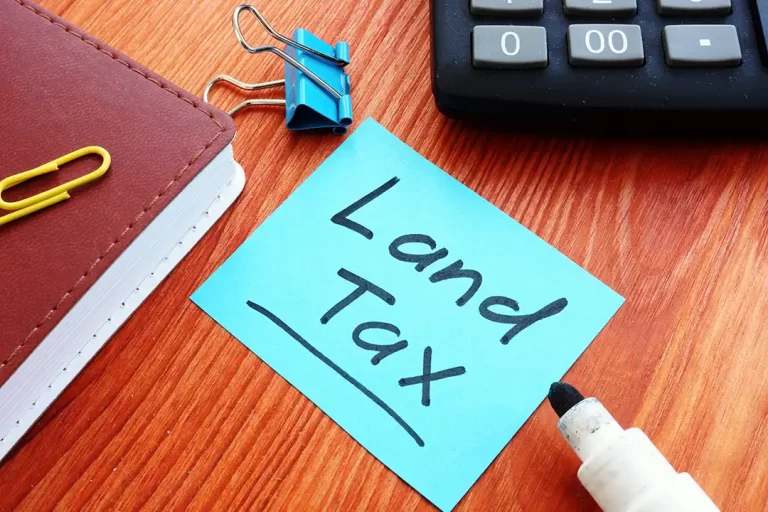New Land Tax Rates Apply in Victoria from 1 January 2024
The 2023 Victorian State Budget introduces substantial changes to land tax as part of the government’s “COVID debt levy,” in effect until 30 June 2033. Aimed at recovering $31.5 billion in state debt, these amendments are expected to impact a large number of Victorians and businesses.
Victoria’s State Revenue Office (SRO) has announced the tax-free threshold for general land tax rates will be reduced from $300,000 to $50,000, effective from 1 January 2024. This means an additional 360,000 landowners will become liable for land tax. It’s crucial for businesses and individuals to understand these new rates.
You can now calculate your Land Tax easily using the new Land Tax Calculator we have put up on our website for you to use for free.
General Land Tax Rates
General Land Tax Rates applies to individual owners, companies, and joint owners of taxable land, excluding primary residences and other exempt categories.
| Total taxable value of land holdings | Land tax payable |
|---|---|
| < $50,000 | Nil |
| $50,000 to < $100,000 | $500 |
| $100,000 to < $300,000 | $975 |
| $300,000 to < $600,000 | $1350 plus 0.3% of amount > $300,000 |
| $600,000 to < $1,000,000 | $2250 plus 0.6% of amount > $600,000 |
| $1,000,000 to < $1,800,000 | $4650 plus 0.9% of amount > $1,000,000 |
| $1,800,000 to < $3,000,000 | $11,850 plus 1.65% of amount > $1,800,000 |
| $3,000,000 and over | $31,650 plus 2.65% of amount > $3,000,000 |
Trust Surcharge Land Tax Rates
Focused on land owned through various trust structures, including family trusts. The Trust Surcharge Land Tax Rates listed here are comprehensive and not supplemental to General Land Tax.
| Total taxable value of land holdings | Land tax payable |
|---|---|
| < $25,000 | Nil |
| $25,000 to < $50,000 | $82 plus 0.375% of amount > $25,000 |
| $50,000 to < $100,000 | $676 plus 0.375% of amount > $50,000 |
| $100,000 to < $250,000 | $1338 plus 0.375% of amount > $100,000 |
| $250,000 to < $600,000 | $1901 plus 0.675% of amount > $250,000 |
| $600,000 to < $1,000,000 | $4263 plus 0.975% of amount > $600,000 |
| $1,000,000 to < $1,800,000 | $8163 plus 1.275% of amount > $1,000,000 |
| $1,800,000 to < $3,000,000 | $18,363 plus 1.1072% of amount > $1,800,000 |
| $3,000,000 and over | $31,650 plus 2.65% of amount > $3,000,000 |
Absentee Surcharge Rate Doubles From 2% to 4%
Additional to general or trust-based land tax, the Absentee Surcharge applies to absentee owners, corporations, or trusts. Effective from 1 January 2024, the surcharge rate doubles from 2% to 4%, with the minimum property value threshold dropping from $300,000 to $50,000, except for trusts where it remains unchanged.
In the context of the Victorian land tax, an Absentee Owner could be an overseas resident or a foreign entity that owns land in Victoria but does not reside there. These absentee owners are subject to an additional surcharge on top of the general or trust-based land tax to account for their non-residence status.
The Absentee Surcharge is intended to ensure that non-residents contribute to the state’s revenue, given that they may not be contributing through other tax mechanisms available to residents.
How To Calculate Land Tax
Calculating land tax in Victoria is based on the total taxable value of all your landholdings. You’ll need to apply the rate that corresponds to your property value bracket in the table of your applicable Land Tax Rates.
Example:
If you own property worth $500,000, you fall into the “$300,000 to < $600,000” bracket.
- Land tax payable = $1,350 + 0.3% of the amount over $300,000
- Land tax payable = $1,350 + 0.3% of ($500,000 – $300,000)
- Land tax payable = $1,350 + 0.3% of $200,000
- Land tax payable = $1,350 + $600
- Total Land Tax = $1,950
What is Land Tax?
Land tax in Victoria is an annual state-based tax levied on property owners based on the total value of all the land they own, excluding their primary residence. The tax is designed to fund various public services and infrastructure projects.
Who Needs To Pay Land Tax?
In Victoria, land tax is generally paid by property owners, excluding those who own their primary residence. The categories include:
- Investment properties
- Commercial properties
- Vacant land
- Some primary production land in metropolitan areas
How To Avoid Land Tax
Avoiding land tax is challenging given that it’s a mandatory state tax, but there are some lawful means of minimising your liability. For example:
- Utilise Principal Place of Residence: Since the principal place of residence is generally exempt, ensuring your property qualifies for this can help avoid land tax.
- Land Trusts: Consult a tax advisor about the possibility of establishing a land trust, as it could potentially provide tax benefits.
- Strategic Investment: Being strategic about the total taxable value of your landholdings can help you stay within lower tax brackets.
Exemptions For Land Tax
In Victoria, certain types of property and landowners can be exempt from land tax. These exemptions include:
- Principal Place of Residence: Your primary home is generally exempt from land tax.
- Primary Production Land: Farms and other primary production lands in rural areas are usually exempt.
- Charitable Trusts: Land owned by charitable organisations often qualify for land tax exemption.
- Retirement Villages: Units within accredited retirement villages are usually land tax-exempt.
Remember that exemption criteria can be complex, so consulting a tax advisor for your specific circumstances is always advisable.
When Is Land Tax Due For Payment?
In Victoria, land tax is generally due on 31 March each year, and it’s based on the total value of all your taxable landholdings as of 31 December of the previous year. The State Revenue Office (SRO) issues assessment notices in the first quarter of the year, specifying your tax liability and due date. If you can’t make the full payment by the due date, the SRO offers payment plans to help you manage your tax obligations. Always adhere to the payment schedule to avoid late fees and penalties.
How To Pay Your Land Tax
The State Revenue Office (SRO) of Victoria offers a range of options for paying your land tax. Online methods are often the most convenient:
My Land Tax
An online application offered by the SRO where you can manage your land tax information, set up payment plans and even apply for exemptions.
Credit Card
Payments can be made online using a Visa or Mastercard. A 0.45% card payment fee will be applied.
BPAY
You can also pay directly from your cheque or savings account via BPAY, although note that payments may take up to 3 days to clear.
AutoPay
This online service lets you schedule instalments for your land tax payment spread over 38 weeks, with options for fortnightly, monthly or four equal instalments.
Westpac Branch
If listed as an option on your assessment notice, you can pay at any Westpac branch using specific account details.
Australia Post Billpay
Pay in person at an Australia Post outlet if this method is mentioned on your assessment notice.
Remember that late payments attract interest. If you are experiencing hardship, you can apply for hardship relief through the SRO.
Difference Between Land Tax and Stamp Duty
Land Tax and Stamp Duty are both taxes related to property in Victoria, but they differ in several key aspects. Both are administered by the State Revenue Office (SRO), yet they serve unique roles in the lifecycle of property ownership. Here’s how they stand apart:
Land Tax
- An annual tax levied on owners of taxable land.
- Excludes most principal places of residence.
- Assessed based on land value as of 31 December each year.
- Governed by the State Revenue Office (SRO).
Stamp Duty
- A one-off tax paid at the time of property purchase.
- Calculated based on the higher of the purchase price or market value.
- Paid at the point of transaction.
- Also overseen by the SRO.
Contact Us For Further Assistance
For expert guidance on Victoria’s land tax intricacies, reach out to Orange Legal Group at 03 8317 1070. Our experienced Conveyancers in Melbourne are here to assist with all your property-related needs.
Please note that this information is intended as a general overview and should not be taken as comprehensive legal advice. Always consult professionals for tailored advice specific to your situation.



